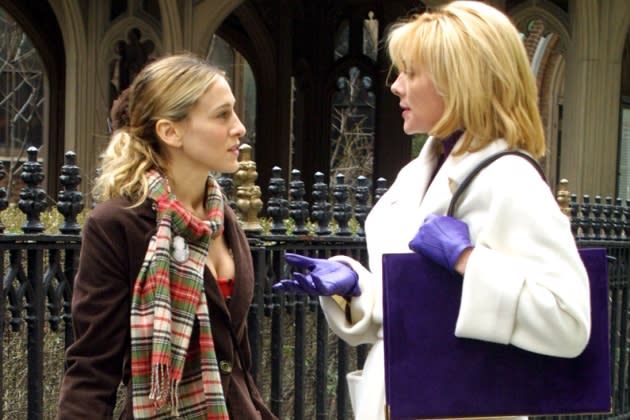
Sarah Jessica Parker has spoken at length, for the first time, about the rift in her relationship with Kim Cattrall — who, like Parker, was one of the four principal stars of the landmark HBO comedy series Sex and the City and its two big-screen adaptations, playing Samantha alongside Parker’s Carrie — and why Cattrall was not asked to be part of And Just Like That, the SATC revival series which recently had its first season on HBO Max.
Speaking to Scott Feinberg on THR’s Awards Chatter podcast, Parker acknowledged that “it’s very hard to talk about the situation with Kim,” but that she wanted “to kind of run through how it happened” to clarify why it is actually not the two-way “catfight” that the media has portrayed it to be. As she put it, “There has been one person talking.”
More from The Hollywood Reporter
In Parker’s view, the issues with Cattrall may date back to 2017, when a third Sex and the City movie was being contemplated but “fell apart” over contractual demands that Cattrall made of Warner Bros., the studio which was to finance and distribute the film. (Reports at the time suggested that Cattrall made her participation contingent upon the studio greenlighting an unrelated project of hers.) “They didn’t feel comfortable meeting where she wanted to meet, and so we didn’t do the movie because we didn’t want to do it without Kim,” Parker recounted. “Were we [she and costars Kristin Davis and Cynthia Nixon] disappointed? Sure. But it happens.”
Then, however, Cattrall began publicly slamming Parker, accusing Parker of having behaved cruelly towards her during the original run of Sex and the City, claiming that the two had never really been friends [and saying the same of her relationship with Davis and Nixon] and even rebuffing Parker’s extension of condolences after Cattrall’s brother died in 2018.
“There were just a lot of public conversations about how she felt about the show,” Parker told Awards Chatter — conversations which Parker found “very painful” because they did not reflect “our experience” [meaning hers, Davis’s or Nixon’s] and because, she added, “I’ve spent a lot of years working really hard to always be decent to everybody on the set, to take care of people, to be responsible to and for people, both my employers and the people that I feel I’m responsible for as a producer of the show. And there just isn’t anyone else who’s ever talked about me this way.”
While Parker readily acknowledged that Cattrall “was a huge contributor to the success” of the Sex and the City series and films, she also explained, “We did not ask her to be part of this [And Just Like That…] because she made it clear that that wasn’t something she wanted to pursue, and it no longer felt comfortable for us, and so it didn’t occur to us. That’s not ‘slamming’ her, it’s just learning. You’ve got to listen to somebody, and if they’re publicly talking about something and it doesn’t suggest it’s some place they want to be, or a person they want to play, or an environment in which they want to be, you get to an age where you’re like, ‘Well, we hear that.’”
Parker further noted, “We felt comfortable moving on without her and without that part because we knew what Michael [Patrick King, the AJLT showrunner] wanted to do. And we thought he handled it beautifully.” [On AJLT, Samantha’s absence is attributed to a falling out that she had with Carrie after Carrie informed her that her services as a publicist were no longer needed.]
Parker concluded her remarks about Cattrall with a plea to the media to stop mischaracterizing what has occurred: “I just want to say one thing, because you’ve allowed me this opportunity: it’s so painful for people to keep talking about this ‘catfight’ — a ‘fight,’ a ‘fight,’ a ‘fight.’ I’ve never uttered fighting words in my life about anybody that I’ve worked with — ever. There is not a ‘fight’ going on. There has been no public dispute or spat or conversations or allegations made by me or anybody on my behalf. I wouldn’t do it. That is not the way I would have it. So I just wish that they would stop calling this a ‘catfight’ or an ‘argument,’ because it doesn’t reflect [reality]. There has been one person talking.”
* * *
Below, you can listen to [starting at 58:20] or read Parker’s full, unedited remarks about Cattrall…
It’s pretty simple, you know? I’ll be as clear as I can. It’s very hard to talk about the situation with Kim because— I’ve been so careful about not ever wanting to say anything that is unpleasant, because it’s not the way I like to conduct conversations that are as complicated as this, you know? So I will kind of run through— I think the best way to do it, honestly, is to kind of run through how it happened.
The studio, when we were going to do the third movie, there were things that she requested that they were not able to do. They didn’t feel comfortable meeting where she wanted to meet, and so we didn’t do the movie because we didn’t want to do it without Kim, and the studio wasn’t going to do it, so it fell apart. It wasn’t that she said ‘no’ to the movie; it’s that the studio said ‘no’ to the movie, which, you know, happens. And every actor has a right to ask for things, to have, you know, a contract that feels good to them. I never would have disputed that ’cause, frankly, that’s not my business. Were we disappointed? Sure. But it happens.
And then there were just a lot of public conversations about how she felt about the show. And, once again, it’s not for me to say that ‘you’re wrong,’ you know, ‘it was, for you, a great thing,’ I don’t know. [But] that hasn’t been our experience. And I’ve spent a lot of years working really hard to always be decent to everybody on the set, to take care of people, to be responsible to and for people, both my employers and the people that I feel I’m responsible for as a producer of the show. And there just isn’t anyone else who’s ever talked about me this way, so it’s very painful.
She was a huge contributor to the success, I think, you know? Her portrayal of that role was wonderful, and it filled out everything, right? There were four points on the picture, and they were all important. But we did not ask her to be part of this because she made it clear that that wasn’t something she wanted to pursue, and it no longer felt comfortable for us, and so it didn’t occur to us. That’s not ‘slamming’ her, it’s just learning. You’ve got to listen to somebody, and if they’re publicly talking about something and it doesn’t suggest it’s some place they want to be, or a person they want to play, or an environment in which they want to be, you get to an age where you’re like, ‘Well, we hear that.’
We were enormously reliant upon Michael [Patrick King] addressing it [on the show] and figuring out how to talk about the absence of Samantha, because we have such affection for Samantha, and we wouldn’t have affection for Samantha — I mean, it’s all tied up in Kim, so you can make the natural inference that it’s there because of Kim’s work. But we felt comfortable moving on without her and without that part because we knew what Michael wanted to do. And we thought he handled it beautifully — that she was there and she was present — and that was kind of nice for all of us and, I think, the audience.
So I hope I’ve discussed that in a way that makes sense.
And I just want to say one thing, because you’ve allowed me this opportunity: it’s so painful for people to keep talking about this ‘catfight’ — a fight, a fight, a fight. I’ve never uttered fighting words in my life about anybody that I’ve worked with ever. There is not a ‘fight’ going on. There has been no public dispute or spat or conversations or allegations made by me or anybody on my behalf. I wouldn’t do it. That is not the way I would have it. So I just wish that they would stop calling this a ‘catfight’ or an ‘argument,’ because it doesn’t reflect actually— There has been one person talking. And I’m not going to tell her not to, or anybody, so that’s been kind of painful for me also.
Best of The Hollywood Reporter




